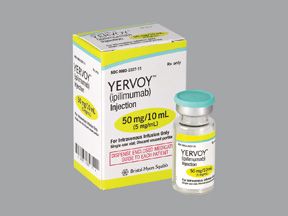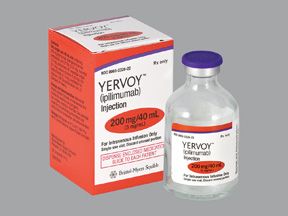Yervoy (ipilimumab) is a brand-name prescription medication. The Food and Drug Administration (FDA) has approved it to treat certain kinds of the following cancers in adults:
- melanoma
- colorectal cancer*
- kidney cancer
- pleural mesothelioma (cancer of the linings surrounding the lungs, abdomen, and heart)
- non-small cell lung cancer
- liver cancer*
The FDA has also approved Yervoy to treat certain types of melanoma and colorectal cancer in children ages 12 years and older.
Yervoy belongs to a drug class called monoclonal antibodies. Yervoy is a
Yervoy is a solution that comes in a vial. A healthcare professional will administer Yervoy as an IV infusion.
For information about the dosages and administration of Yervoy, keep reading. For a comprehensive look at Yervoy, see this article.
* The FDA has granted
This article describes typical dosages and dosing schedules for Yervoy provided by the drug’s manufacturer. But your doctor will prescribe the Yervoy dosage that’s right for you.
This section describes the typical Yervoy dosages.
Yervoy form
Yervoy comes as a solution in a vial. A healthcare professional will administer the medication as an IV infusion. You’ll receive Yervoy in a hospital, an infusion center, or your doctor’s office.
Yervoy strengths
Yervoy comes in one strength: 5 milligrams per milliliter (mg/mL).
The vials come in two sizes. One is 10 mL, which contains 50 mg of Yervoy. The second size is 40 mL, and it contains 200 mg of Yervoy.
Typical dosages
The following information describes dosages that are commonly used or recommended.Your doctor will determine the best dosage to fit your needs.
Dosage for melanoma
The typical dose of Yervoy to treat melanoma that’s unresectable or metastatic is 3 milligrams per kilogram (mg/kg). You’ll likely receive this dose once every 3 weeks for a maximum of four doses. Unresectable means the cancer isn’t able to be removed with surgery. Metastatic means the cancer has spread to other parts of the body.
You may also receive Opdivo (nivolumab) with and after completing Yervoy treatment. Your doctor can advise you on the right nivolumab dosing for you.
The typical dose of Yervoy, when used in combination with other treatments for melanoma, is 10 mg/kg. You’ll likely receive Yervoy once every 3 weeks for a maximum of four doses. After that, you may receive Yervoy once every 12 weeks for up to 3 years.
Dosage for colorectal cancer
The typical dose of Yervoy to treat colorectal cancer is 1 mg/kg. You’ll usually receive this dose once every 3 weeks for a maximum of four doses. You’ll also likely receive nivolumab with and after completing Yervoy treatment. Your doctor will determine what your nivolumab dosage will be.
Dosage for kidney cancer
The typical dose of Yervoy to treat kidney cancer is 1 mg/kg. You’ll usually receive this dose once every 3 weeks for a maximum of four doses. You’ll also likely receive nivolumab with and after completing Yervoy treatment. You can talk with your doctor about the right dosage of nivolumab for you.
Dosage for pleural mesothelioma
The typical dose of Yervoy to treat pleural mesothelioma is 1 mg/kg. You’ll usually receive this dose once every 6 weeks for up to 2 years, as long as the drug is safe and effective for you. You’ll also likely receive nivolumab during Yervoy treatment. Your doctor can tell you more about your nivolumab dosage.
Dosage for non-small cell lung cancer
The typical dose of Yervoy to treat non-small cell lung cancer (NSCLC) is 1 mg/kg. You’ll usually receive this dose once every 6 weeks for up to 2 years, as long as the medication is safe and effective for you. You will likely also receive nivolumab during Yervoy treatment. Talk with your doctor about the right dosage of nivolumab for you.
If you have NSCLC that’s metastatic or keeps returning, you’ll also likely receive two cycles of chemotherapy. Your doctor can tell you more.
Dosage for liver cancer
The typical dose of Yervoy to treat liver cancer is 3 mg/kg. You’ll usually receive this dose once every 3 weeks for a maximum of four doses. You’ll also likely receive nivolumab during and after Yervoy treatment. You can talk with your doctor about the right dosage of nivolumab for you.
Children’s dosage
Yervoy is FDA-approved to treat children 12 years and older who have certain kinds of colorectal cancer or melanoma. The total dosage will depend on the child’s weight.
Children’s dosage for melanoma
The typical Yervoy dosages for melanoma in children are the same as for adults. See “Dosage for melanoma” above for details.
Children’s dosage for colorectal cancer
The typical Yervoy dosage for colorectal cancer in children is the same as for adults. See “Dosage for colorectal cancer” above to learn more.
Long-term treatment
The length of Yervoy treatment will depend on the type of cancer you have and how well you tolerate the medication. Yervoy is typically prescribed for a maximum of four doses (12 weeks) for melanoma, colorectal cancer, kidney cancer, and liver cancer.
For pleural mesothelioma or non-small cell lung cancer, Yervoy treatment may last up to 2 years, as long as the drug is safe and effective for you. You can talk with your doctor about how long your treatment might last.
If you’re receiving Yervoy for melanoma in combination with other treatments, you may receive Yervoy for up to 3 years as long as the drug is safe and effective for you. Your doctor can advise you on how long you may need Yervoy treatment.
The Yervoy dosage your doctor prescribes will depend on several factors. These include:
- the type and severity of the condition Yervoy is treating
- your weight
- other medical conditions you may have
A healthcare professional will give you Yervoy as an IV infusion. This is an injection into a vein over a period of time. You’ll receive Yervoy in a hospital, an infusion center, or your doctor’s office.
The length of the infusion depends on the type of cancer you have. The typical length of an infusion is 30 minutes. However, if you receive Yervoy for melanoma, the time will likely be 90 minutes.
If you miss an appointment for a Yervoy infusion, let your doctor know right away. The office staff will likely want to reschedule you as soon as possible. If you receive your infusions elsewhere, call that location to set up a new appointment.
To help make sure you don’t miss an appointment, try setting a reminder on your phone or putting your schedule on a calendar.
The dosages in this article are typical dosages provided by the drug’s manufacturer. If your doctor recommends Yervoy, they will prescribe the dosage that’s right for you.
If you have questions about the dosage of Yervoy that’s right for you, talk with your doctor.
Besides learning about dosage, you may want other information about Yervoy. These additional articles might be helpful:
- More about Yervoy. For information about other aspects of Yervoy, refer to this article.
- Side effects. To learn about side effects of Yervoy, see this article. You can also look at the Yervoy prescribing information.
- Details about your condition. For more information about your condition, see our cancer hub and list of cancer and oncology articles. You can also explore our other resources below.
- Skin cancer. For facts about melanoma, see our dermatology and skin care hub, as well as our list of melanoma and skin cancer articles.
- Colorectal cancer. For details about colorectal cancer, see our list of colorectal cancer articles.
- Lung cancer. To learn more about lung cancer, you can refer to our lung cancer hub and list of related articles.
Disclaimer: Medical News Today has made every effort to make certain that all information is factually correct, comprehensive, and up to date. However, this article should not be used as a substitute for the knowledge and expertise of a licensed healthcare professional. You should always consult your doctor or another healthcare professional before taking any medication. The drug information contained herein is subject to change and is not intended to cover all possible uses, directions, precautions, warnings, drug interactions, allergic reactions, or adverse effects. The absence of warnings or other information for a given drug does not indicate that the drug or drug combination is safe, effective, or appropriate for all patients or all specific uses.


